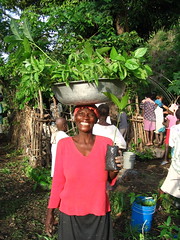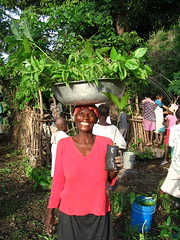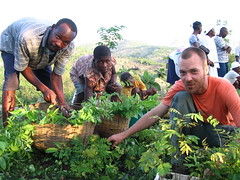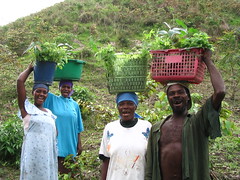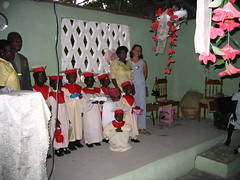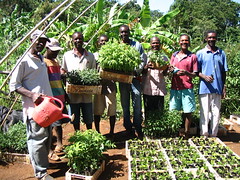This is a recent article that appeared on rabble.ca. It's interesting,
which is why we post it here. This doesn't mean I agree, nor does it mean
that MCC endorses it.
Matt
Aristide in exile
>by Naomi Klein
July 15, 2005
When United Nations troops kill residents of the Haitian slum Cité Soleil,
friends and family often place photographs of exiled President Jean-Bertrand
Aristide on their bodies. The photographs silently insist that there is a
method to the madness raging in Port-au-Prince. Poor Haitians are being
slaughtered not for being ³violent,² as we so often hear, but for being
militant; for daring to demand the return of their elected president.
It was only ten years ago that President Clinton celebrated Aristide's
return to power as ³the triumph of freedom over fear.² So what changed?
Corruption? Violence? Fraud? Aristide is certainly no saint. But even if the
worst of the allegations are true, they pale next to the rap sheets of the
convicted killers, drug smugglers and arms traders who ousted Aristide and
continue to enjoy free rein, with full support from the Bush Administration
and the UN. Turning Haiti over to this underworld gang out of concern for
Aristide's lack of ³good governance² is like escaping an annoying date by
accepting a lift home from Charles Manson.
A few weeks ago I visited Aristide in Pretoria, South Africa, where he lives
in forced exile. I asked him what was really behind his dramatic falling-out
with Washington. He offered an explanation rarely heard in discussions of
Haitian politics ‹ actually, he offered three: ³privatization, privatization
and privatization.²
The dispute dates back to a series of meetings in early 1994, a pivotal
moment in Haiti's history that Aristide has rarely discussed. Haitians were
living under the barbaric rule of Raoul Cédras, who overthrew Aristide in a
1991 U.S.-backed coup. Aristide was in Washington and despite popular calls
for his return, there was no way he could face down the junta without
military back-up. Increasingly embarrassed by Cédras's abuses, the Clinton
Administration offered Aristide a deal: U.S. troops would take him back to
Haiti ‹ but only after he agreed to a sweeping economic program with the
stated goal to ³substantially transform the nature of the Haitian state.²
Aristide agreed to pay the debts accumulated under the kleptocratic Duvalier
dictatorships, slash the civil service, open up Haiti to ³free trade² and
cut import tariffs on rice and corn in half. It was a lousy deal but,
Aristide says, he had little choice. ³I was out of my country and my country
was the poorest in the Western hemisphere, so what kind of power did I have
at that time?²
But Washington's negotiators made one demand that Aristide could not accept:
the immediate sell-off of Haiti's state-owned enterprises, including phones
and electricity. Aristide argued that unregulated privatization would
transform state monopolies into private oligarchies, increasing the riches
of Haiti's elite and stripping the poor of their national wealth. He says
the proposal simply didn't add up: ³Being honest means saying two plus two
equals four. They wanted us to sing two plus two equals five.²
Aristide proposed a compromise: Rather than sell off the firms outright, he
would ³democratize² them. He defined this as writing antitrust legislation,
insuring that proceeds from the sales were redistributed to the poor and
allowing workers to become shareholders. Washington backed down, and the
final text of the agreement ‹ accepted by the United States and by a meeting
of donor nations in Paris ‹ called for the ³democratization² of state
companies.
But when Aristide began to implement the plan, it turned out that the
financiers in Washington thought his democratization talk was just public
relations. When Aristide announced that no sales could take place until
Parliament had approved the new laws, Washington cried foul. Aristide says
he realized then that what was being attempted was an ³economic coup.² ³The
hidden agenda was to tie my hands once I was back and make me give for
nothing all the state public enterprises.² He threatened to arrest anyone
who went ahead with privatizations. ³Washington was very angry at me. They
said I didn't respect my word, when they were the ones who didn't respect
our common economic policy.²
Aristide's relationship with Washington has been deteriorating ever since:
While more than $500 million in promised loans and aid were cut off,
starving his government, USAID poured millions into the coffers of
opposition groups, culminating ultimately in the February 2004 armed coup.
And the war continues. On June 23, Roger Noriega, assistant secretary of
state for Western Hemisphere affairs, called on UN troops to take a more
³proactive role² in going after armed pro-Aristide gangs. In practice, this
has meant a wave of Falluja-like collective punishment inflicted on
neighborhoods known for supporting Aristide. On July 6, for instance, 300 UN
troops stormed Cité Soleil, blocking off exits and firing from armored
vehicles. The UN admits that five were killed, but residents put the number
of dead at no fewer than 20. Reuters correspondent Joseph Guyler Delva says
he ³saw seven bodies in one house alone, including two babies and one older
woman in her 60s.² Ali Besnaci, head of Médecins Sans Frontières in Haiti,
confirmed that on the day of the siege 27 people came to the MSF clinic with
gunshot wounds, three-quarters of them women and children.
Yet despite these attacks, Haitians are still on the streets ‹ rejecting the
planned sham elections, opposing privatization and holding up photographs of
their president. And just as Washington's experts could not fathom the
possibility that Aristide would reject their advice a decade ago, today they
cannot accept that his poor supporters could be acting of their own accord ‹
surely Aristide must be controlling them through some mysterious voodoo
arts. ³We believe that his people are receiving instructions directly from
his voice and indirectly through his acolytes that communicate with him
personally in South Africa,² Noriega said.
Aristide claims no such powers. ³The people are bright, the people are
intelligent, the people are courageous,² he says. They know that two plus
two does not equal five.
Naomi Klein is the author of No Logo and Fences and Windows. This column has
appeared in The Nation.
